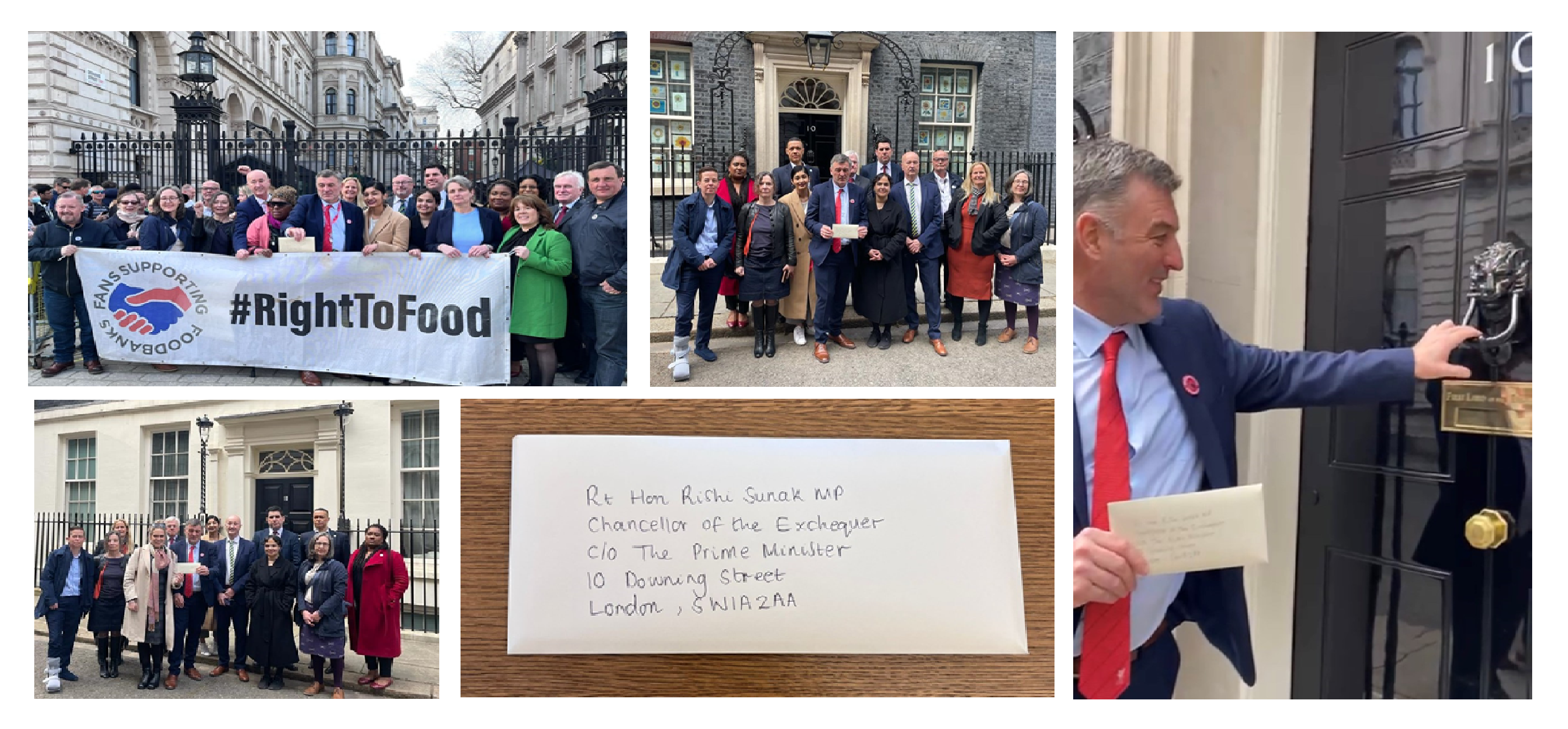"Hunger Is A Political Choice": Politicians, football clubs, medics, academics, trade unions, mayors, councils and voluntary organisations come together to deliver an urgent letter – and message – to Chancellor Rishi Sunak.
Liverpool West Derby MP Ian Byrne this afternoon led a delegation of Right To Food campaign supporters to Downing Street to deliver a letter – and a
message – to Chancellor Rishi Sunak ahead of Wednesday’s Spring Budget. Eleven million people in the UK now experience food insecurity and this situation will continue to get worse as people face the worst cost-of-living crisis in 30 years. Millions of people now face a choice between whether to
freeze or starve in their homes as the cost of energy, food, essentials and bills all rise dramatically.
The Right To Food campaign believes that Hunger Is A Political Choice and has today delivered a letter to the Chancellor from Right To Food campaign leader Ian Byrne MP, co-signed by a wide range of campaign supporters, which urges Mr Sunak to deliver on five key demands of the Right To Food campaign in Wednesday’s mini budget.
Signatories to Ian Byrne MP’s letter to Chancellor Sunak include:
• Liverpool FC
• Liverpool FC Women
• Liverpool FC Foundation
• Everton FC
• Millwall FC
• Millwall FC Community Trust
• Greater Manchester Mayor Andy Burnham
• Liverpool City Region Mayor Steve Rotherham
• Liverpool Mayor Joanne Anderson
• North of Tyne Mayor Jamie Driscoll
• Sharon Graham, General Secretary of Unite the Union
• Gary Smith, General Secretary of GMB
• Ian Hodson, President of The Bakers Food and Allied Workers Union (BFAWU)
• Sarah Woolley, General Secretary of BFAWU
• Dave Ward, General Secretary of the Communication Workers Union
• Dr Mary Bousted and Kevin Courtney, joint General Secretaries of the National Education Union (NEU)
• Cllr Nick Forbes, Leader of Newcastle City Council
• Cllr Chris Read, Leader of Rotherham Metropolitan Borough Council
• Cllr Keith Aspden, Leader of City of York Council
• Cllr Matthew Brown, Leader of Preston City Council
• Cllr Terry Fox, Leader of Sheffield City Council
• Professor Michel Pimbert, Agroecology and Food Politics, Coventry University
• Dr Regina Keith, Food, Nutrition and Public Health, University of Westminster
• Professor Eileen O’Keefe, Emeritus of Public Health, London Metropolitan University
• Professor Ian Sinha, Consultant Respiratory Paediatrician, Alder Hey
Children’s Hospital, Liverpool
• Professor John O’Keefe, Professor of Cognitive Neuroscience, University College London
• Fans Supporting Foodbanks
• Churches Together Merseyside
• 25 Members of Parliament
The letter from Ian Byrne MP on behalf of the Right To Food campaign tells Chancellor Sunak that the Government is responsible for creating an
environment that is pushing millions of families into food poverty. It reads: “The political choices you make over the next few months are the difference between life and death for the most vulnerable in our communities. Hunger is a political choice. Fuel poverty is a political choice. Choices made by your Government. Something must change.”
In the letter the campaign calls directly on Chancellor Sunak to include provision for key campaign requests in the Spring Statement on 23 March
2022 and to choose to end to end hunger in the UK by:
1. Providing universal free school meals.
2. Stating how much of minimum / living wages and benefits (on which people are expected to live) is for food.
3. Right To Food legislation to be accompanied by oversight and enforcement powers granted to a new independent regulatory body that will hold Government to account.
4. Funding community kitchens including dining clubs and ‘meals-on-wheels’ services for the elderly and vulnerable, school holiday meals for those most in need and community cookery clubs.
5. Ensuring food security - and taking this duty into account when setting competition, planning, transport, local government and all other policy. Ian Byrne MP for Liverpool West Derby who is leading the Right To Food campaign in Parliament says: “We know that food poverty leads to health and life expectancy inequality, malnutrition, obesity and a host of other related problems, including even long-term epigenetic changes. It will affect children’s educational attainment and life chances. Less measurable but no less important, is the effect on
individual human dignity and social cohesion over time in our polarised nations of food banks next to investment banks.
“The pandemic has demonstrated that in the face of new threats and challenges, society is only as resilient as its most vulnerable and its
mechanisms for caring for everyone.
“This is a humanitarian crisis requiring permanent solutions, not mere tinkering with a fundamentally broken system. The time for sticking plasters is over. No more reliance on foodbanks, donations and food pantries. We need systemic change so that all people might live with the opportunity of health, happiness and dignity. Enforceable food rights are needed so that Government is accountable for ensuring that nobody goes hungry – and is prevented from making decisions that lead to people being unable to put a meal on the table.
“The buck stops at the door of Government and the Right To Food campaign calls on the Chancellor today to make the Right to Food a reality for millions of people in his Spring Statement. I also extend an open invitation for Mr Sunak to visit Liverpool, where one-third of the people are experiencing food insecurity.”
Ends
Notes to editors:
• Ian Byrne MP launched the Right To Food campaign in November 2020.
• On 20 January 2021, Liverpool became the first ‘Right to Food City’ in the UK when the city council unanimously called for the Right to Food to be
incorporated into the National Food Strategy, an independent review commissioned by Government into the UK’s food system. Further
endorsements from across Liverpool followed, including from Liverpool FC, Everton FC, faith leaders, businesses, charities and members of the public.
• Right to Food cities and towns now include Liverpool, Manchester, Greater Manchester Combined Authority, Liverpool Combined
Authority, Rotherham, Brighton and Hove, Haringey, St Helens, Preston, Lancaster, Durham, Newcastle, Portsmouth, Totnes, Coventry, Sheffield,
Birmingham.
• On 6 December 2021 Ian Byrne MP tabled a fresh Early Day Motion (EDM) no 746 on Food Insecurity. You can find this EDM on the
Parliament website: https://edm.parliament.uk/early-daymotion/59238/food-insecurity
• In March 2022 Ian Byrne MP was named MP of the Year at the prestigious Patchwork Foundation MP Awards. At a ceremony in
Westminster hosted and presented by Patchwork Patron, Mr Speaker, Rt Hon Sir Lindsay Hoyle MP, Ian Byrne said he was “honoured and
humbled” to win Overall MP of The Year, the foundation’s top honour. Ian Byrne MP was recognised for his ‘Right to Food’ campaign to end the
food insecurity faced by 11 million people in the UK. He has also been championing greater access to justice for working class communities,
funding a housing and benefits solicitor to work in his own office so they can do more than just signpost, and has also been a continuous supporter of workers and their rights during the Pandemic.www.ianbyrne.org/news/west-derby-mp-ian-byrne-wins-prestigiousmp-of-the-year-award
• The Right To Food campaign has also launched a new petition which calls
on the Government to make access to food a legal right and is asking
5
individuals and organisations to sign and share it. You can find the Right
To Food petition here: https://bit.ly/3y4H5tK
• In March 2021 the Right To Food campaign team made its submission to
the National Food Strategy including five key ‘asks’ which, if adopted by
Government, would have provided an achievable, tangible and legally
binding route out of food poverty for millions of people in the UK. These
were: universal free school meals; community kitchens; reasonable
portions in benefits and wages; ensured food security and independent
enforcement. Read the full submission here:
https://www.ianbyrne.org/right-to-food. A range of religious bodies,
trade unions and campaign groups also wrote to Henry Dimbleby, Chair
of the National Food Strategy, asking for Right To Food legislation to be
included in in their recommendations to Government.
• The Right To Food campaign is now calling directly on Chancellor Rishi
Sunak MP to deliver a Right To Food in his Spring Statement on 23 March
2022. Hunger Is A Political Choice and we ask the Chancellor to’ ‘choose’ to
end food poverty by making provision for its five key campaign asks:
o Children in Britain should not be going hungry. The Right To Food
campaign calls for universal free school meals.
o How much money is factored in for food when setting
minimum/living wages and benefits? Government to state how
much of minimum / living wages and benefits (on which people are
expected to live) is for food.
o One in three children in Britain currently live below the poverty line,
leading to health and life expectancy inequality, malnutrition,
obesity and other problems. We call for the Right To Food to be
enshrined in law.
o Independent enforcement of legislation. Right To Food legislation
must be accompanied by oversight and enforcement powers granted
to a new independent regulatory body that will hold Government to
account.
o Community kitchens - provide a workable solution. Government
should fund dining clubs and ‘meals-on-wheels’ services for the
elderly and vulnerable, school holiday meals for those most in need
and cookery clubs for the wider community.
o Ensured food security. Government must ensure food security and
take this duty into account when setting competition, planning,
transport, local government and all other policy.
• Right To Food campaign - 5 key ‘asks’ of Government as originally listed
in our National Food Strategy submission (for reference):
o Universal Free School Meals:
Every child in compulsory education should be provided with a
nutritious, free school breakfast and lunch. This will be a legal duty
upon the Government and devolved governments which in turn
must be executed by the providers of state school education.
There will be those who say that we “cannot afford to do this”.
We say, “how can we afford not to?” If we accept the universal
and compulsory requirement that all children up to the age of 16
be in school, why do we break from that principle of universal
care, nurturing and protection in relation to their meals during the
school day? We think it absurd that children are not provided with
adequate shelter, heating, drinking water and sanitary provision
whilst in school. Why take a different approach to the equally
essential elements of learning materials and food? The evidence
of better concentration, behaviour and learning when properly
nourished is irrefutable. Breakfast clubs already operate with
considerable success in various places. Universal provision
matches the ethos and aspiration of our education system. It
further avoids the bureaucracy and stigma of means-testing our
school-age children.
o 2. Community Kitchens:
A great deal of wasted resource and potential stems from the
segmented and outsourced nature of so many public services. If
school kitchens become an engine of better nutrition for our kids
during the day, why should they not be equally well utilised during
evenings, weekends and school holidays? There should be a legal
framework of duties, shared by national, and local government as
well as state funded schools themselves, to provide “community
kitchens” that provide dining clubs and “meals-on-wheels” for the
elderly and vulnerable, school holiday meals for those most in
need and cookery clubs and lessons for the wider community. This
policy might be as powerful a tool in tackling loneliness and social
isolation as in tackling food poverty and obesity in our nations.
• 3.Reasonable portions in benefits and wages:
To tackle the invidious choice that too many people must make
between food, fuel and other essentials every day, the
Government should be under a duty when setting minimum and
living wages and any relevant social security benefit (on which
people are expected to live), to state how much of the prescribed
sum has been notionally calculated for food. This transparent
figure can then be subject to public scrutiny, parliamentary debate
and ultimately review in the courts (on the application of a
relevant regulator or other interested party).
4. Ensured food security:
There should be a duty on the Government (and devolved
administrations) to ensure food security for our nations and to
take this duty into account when setting competition, planning,
transport, local government and all other policy. There should be
corresponding powers to issue compulsory directions to private
parties in the context of anticipated local, regional or national
“food emergencies” relating either to food standards or supply.
5. Independent enforcement:
The various new rights and duties outlined above will only be
meaningful if accompanied by sufficient oversight and
enforcement powers granted to a new independent regulatory
body. This could take the form of an enhanced and additionally
resourced combined Food Standards and Security Agency.
However, the precise agency or agencies is less important than
independence, powers and duties, adequate resourcing and the
ultimate ability to seek final recourse through the courts. The
history of the post-war period (not least since the decimation of
civil legal aid) teaches us that rights without enforcement powers
and resources can be very hollow indeed. Further, this expert
independent regulator will be better positioned than individual
citizens, civil society campaigns or even the courts by themselves,
to lead the discourse around holding all future governments and
other relevant actors to account in the discharge of their duties
around essential food rights for all the people of the UK.
• In addition to leading on the national Right To Food campaign, Ian Byrne
MP has also set up a local community project called Grow West Derby to
support his constituents to access good food as well as learning new
skills and being involved in a community project. West Derby residents
are supported to grow their own food and supply local food pantries
with any excess food they produce. All Liverpool West Derby residents
are welcome to get involved in this initiative. More information and a sign-up form can be accessed here: https://www.ianbyrne.org/growwest-derby
• Mr Byrne has been leading the Right To Food campaign in Parliament
since November 2020 and has been a food poverty campaigner since
2015, when he co-founded Fans Supporting Foodbanks to collect food
donations for Liverpool foodbanks from football fans attending home
matches at the grounds of Liverpool FC and Everton FC. Fans Supporting
Foodbanks is now a national network and is partnering Mr Byrne on the
Right To Food campaign.
For further information on the Right To Food campaign please visit:
www.ianbyrne.org/righttofood-campaign or contact the office of Ian Byrne
MP on email: ian.byrne.mp@parliament.uk or phone: 0151 222 2345





